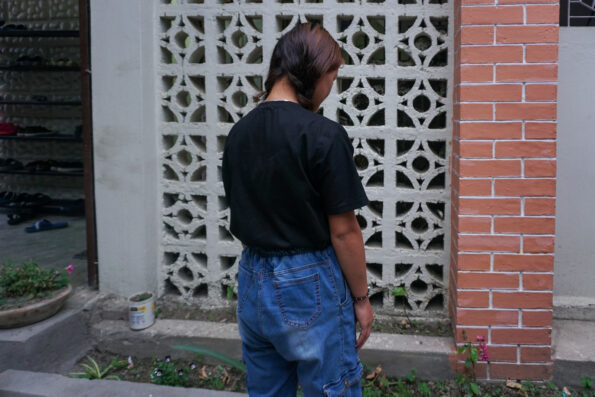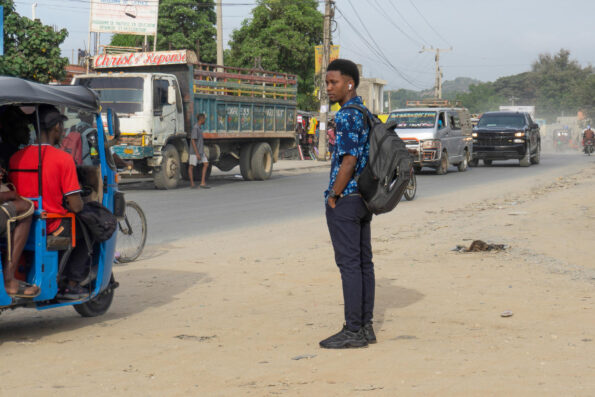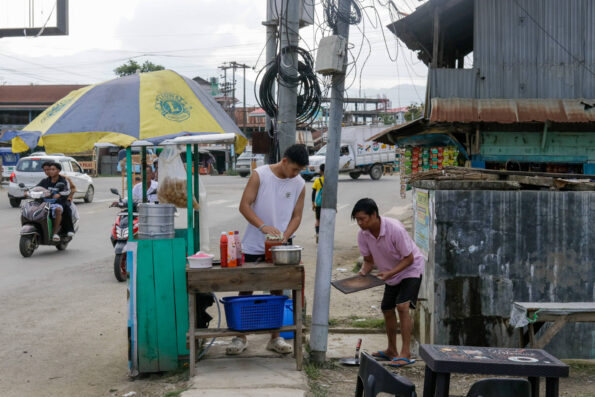
Irene Zih Fon, GPJ Cameroon
Awah Francisca Mbuli, along with another member of her organization, Committee for the Fight against Human Trafficking and Rights Abuse, shares information about forced labor of Africans in the Middle East.
KUMBA, CAMEROON — Awah Francisca Mbuli was working at a cocoa store in Kumba, a city in the South West region of Cameroon, last year, when she heard about a job opportunity in Kuwait.
It had been nine years since Mbuli graduated from university with a degree in business administration but she was yet to find a proper job. Her wage at the cocoa store didn’t cover her expenses, so Mbuli, 32, began to consider the Kuwait job. A travel agent told her that she would work as an English teacher in the small gulf country and earn a salary of 500,000 Central African Francs ($850) per month.
“The salary was so encouraging that it motivated me 100 percent to go there,” Mbuli says.
But when she arrived in Kuwait in May 2015, it was clear that she wouldn’t get what she was promised. A man and his family came to pick her up and told her that she would work for them as a maid, she says.
“While still in their car, the man collected my travel documents, certificate of non-conviction and passport,” she says. “He told me my job would be to look after his two children and do all the house chores.”
Mbuli says she worked tirelessly for the family and had little time to sleep. She hardly ate, she says.
“I lived virtually on tea and bread,” she says.
After two weeks, Mbuli demanded that she be taken to her agent so she could demand that she have a different job. The man, angry, drove her to the agent and asked for a refund, she says. Another employer took her home, but the children in that house rejected her, saying they didn’t want a Black maid. Mbuli says she was again returned to the agent, and again given to another family.
Working conditions in that home weren’t any better than in the first, and in addition, her employer sexually assaulted her when his wife was away, she says.
She began planning her escape. She joined a chat group for foreign domestic workers and browsed online for humanitarian organizations that help trafficked people. Freedom for All, an anti-slavery organization, promised to help her to return to Cameroon.



One day when her employers were away, she left the house and was picked up by another Cameroonian domestic worker she had met in the chat group. There is no Cameroonian embassy in Kuwait, so that lady took her to the Central African Republic embassy and Freedom for All bought her air ticket to Cameroon. She returned home in August.
For Mbuli, freedom marked the beginning of a new era. In December, she founded Committee for the Fight against Human Trafficking and Rights Abuse (COMATHRA). The organization works with partners abroad, including Freedom for All, to bring back more women and girls trapped in the Middle East. COMATHRA works to free people of all nationalities, but focuses on people from African nations.
Kuwait is a choice destination for men and women from Africa and South Asia seeking domestic and construction work. Migrant workers make up 80 percent of Kuwait’s labor force, according to Human Rights Watch. They’re often subjected to forced labor, long working hours, food deprivation, threats, physical or sexual abuse, and restrictions on movement, according to the U.S. government’s Trafficking In Persons Report, 2015.
A sponsorship system which ties a migrant worker’s legal status to his or her employer further exposes the workers to abuse, according to Human Rights Watch. Migrants who leave their sponsoring employers can be arrested and deported, according to the organization.
Isabelle Lafortune Makota, the regional delegate in the Ministry of Women’s Empowerment and the Family for the Littoral region of Cameroon, says her ministry is aware that Cameroonian girls are exploited in Kuwait and other countries in the Middle East, but she is not aware of any measures taken by the ministry to address the situation.
Many women travel to Kuwait because they’re jobless and desperate, says Dennis Akum, the manager at Global Education Services, a travel and education agency in Douala.
“Most are degree-holders who say their parents shout at them for not having jobs despite getting education,” Akum says. “So, their only option is to go somewhere else to struggle, anywhere, cut off from their families.”
Poverty is also rife and people are tempted to travel abroad hoping things might be better there, says Laura Tufon, the coordinator of the Justice and Peace Commission in Cameroon, an organization involved in fighting human trafficking. Justice and Peace Commission was one of the organizations Mbuli reached out to for help when she was in Kuwait.
Akum advises Cameroonian women travelling to Kuwait and other countries in the Middle East for work to do a background check on the people hiring them. But that’s difficult, since most workers only learn their employers’ names once they arrive.
In addition, the government of Cameroon should monitor the people who go to gulf countries, he says. Right now, the workers’ families alone are obligated to keep track of their loved one’s situation.
“The government should not leave everything to families of victims because they are Cameroonians; they’re dying and we’re losing citizens,” Akum says.
There is some progress being made to protect trafficked people in Kuwait. The country last year passed a law prohibiting employers from confiscating workers’ passports. But the law did not specify penalties and it did not create enforcement mechanisms, according to Human Rights Watch.
Mbuli’s organization is quickly making a difference for Cameroonians stuck in Kuwait. As of early May, COMATHRA, in partnership with Freedom for All and other organizations, has arranged for the return of 25 people stuck there, says Max Schilling of Freedom for All.
The rescued people include Cameroonians, Ghanaians and Nigerians, Schilling says.
Mbuli says she works with a contact at a government shelter in Kuwait who helps her connect with women there. When she can reach women who are still trapped in their employers’ homes, she advises them to escape to the shelter so she can assist them.
Since most of the workers’ passports are seized by their employers, Mbuli and her team help them get alternative travel documents. It takes about three weeks to have the documents processed at the Cameroonian embassy in Saudi Arabia, Mbuli says.
Freedom for All has for flights for most of the women, Schilling says.
“Francisca is a communicative powerhouse,” Schilling says. “Through her, we were able to get in contact with a number of women who have either survived human trafficking or are currently victims. We are hoping to build and ultimately protect and nurture that community.”
“COMATHRA is our lifeline,” he adds.
In addition to finding trafficked women in Kuwait, Mbuli also works to educate people in Cameroon about the dangers of travelling to the Middle East for work.
Despite running her own organization, she’s still looking for paid work. As of late May, she was in New York City for an internship arranged through Freedom for All, but planned to look for paid work when she returned to Cameroon.
“I see myself as a humanitarian actor,” she says. “But as a graduate I really wish to have a job of my own.”
Irene Zih Fon translated one interview from French.







